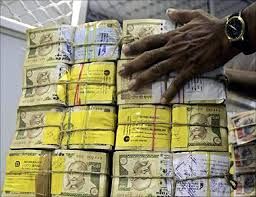 The arrest of Sudhir Kumar Jain, chairman and managing director of Syndicate Bank, on allegations of bribery might stifle credit flow to small businesses, bankers say.
The arrest of Sudhir Kumar Jain, chairman and managing director of Syndicate Bank, on allegations of bribery might stifle credit flow to small businesses, bankers say.
On Saturday, Jain was arrested by the Central Bureau of Investigation for allegedly accepting a bribe of Rs 50 lakh (Rs 5 million) to increase the credit lines of certain companies.
Bankers said fear of loan losses impairing their careers could make officers wary of sanctioning new loan proposals on their own.
“Sanctioning of small loans will bear the brunt.
"This is a high-profile case and officers at the branch level will be extremely reluctant to approve credit proposals.
"The economic slowdown has already put stress on the quality of loans and no one will want to take a decision in the current environment,” said a former chairman and managing director of a public sector bank, requesting anonymity.
Recent studies suggest the action of law enforcement and investigative agencies have had a negative impact on lending by PSBs.
It was found overall lending had fallen dramatically in branches facing action by the Central Vigilance Commission.
Also, there is a contagion effect, as lending in branches located in proximity to the affected one takes a hit.
“The impact of CVC action on lending is persistent; it takes slightly more than two years from the time of such action for lending to recover, and the impact of the consequent loan officer conservatism is predominantly felt by small borrowers, traditionally considered by banks as opaque and risky,” a PJ Nayak-headed
In 2009, the credit approval procedure underwent a change. Currently, loan proposals pertaining to retail and small advances are approved by branch managers, while big-ticket loans are sanctioned at the regional or zonal levels or in head offices.
Typically, large advances are approved by a credit appraisal committee comprising the chairman, managing director, executive directors and general managers. The sanctioning power at the branch, regional and zonal levels varies across banks.
Analysts feel the credit appraisal system and governance standards in PSBs remain weak, leaving scope for financial fraud. “There is an urgent need to re-look at the systems and processes of PSBs.
"The system is weak and it obliterates differences between good and bad employees.
"Hence, whenever there is a probe, both are equally vulnerable. This hampers the decision-making process,” said an expert with a global consultancy firm.
Analysts said the Reserve Bank of India’s credit appraisal norms were considered “guiding principles”, adding lenders framed their own systems to assess and sanction loan proposals.
Though most bankers claim to have moved away from a system in which the chairman approves a loan proposal unilaterally, critics say at credit appraisal committee meetings, executive directors or general managers rarely question a chairman’s decisions.










